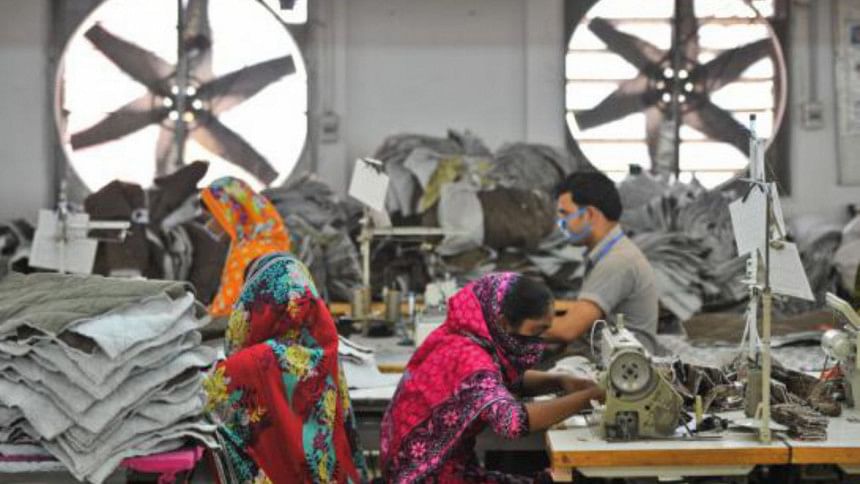Apparel export can hit $95 billion by 2030 riding on manmade fibre

Apparel exports from Bangladesh will cross $95 billion by 2030 if the country can expand its share in the global market for manmade fibre (MMF) to 12 per cent from less than 5 per cent at present, according to a recent study.
MMF apparel items accounted for $222 billion of the $440 billion global garments market last year, when cotton-based products contributed $190 billion.
As such, almost half of all apparel exports worldwide are of MMF products while 42 per cent are cotton-based garment items.
However, the picture is reverse in Bangladesh, where 72 per cent of the garment exports are cotton-based apparels and just 24 per cent are MMF, the study said.
Of the total $42 billion apparel exports from Bangladesh in the last fiscal year, $30 billion were cotton-based garment items
Mohammad Abdur Razzaque, research director of the Policy Research Institute (PRI) and author of the study, presented the outcomes at a programme on "Man-made fibres for moving up the apparel value chain in the context of LDC graduation".
The event was jointly organised by the Economic Relations Division (ERD) and Bangladesh Garment Manufacturers and Exporters Association (BGMEA) at the National Economic Council auditorium in Dhaka yesterday.
Of the total $42 billion apparel exports from Bangladesh in the last fiscal year, $30 billion were cotton-based garment items.
Bangladesh already accounts for 16 per cent of all cotton apparel shipments worldwide and the country will soon become the largest cotton-based garments exporter as China, the largest supplier at present, has been losing its market share.
Global MMF apparel exports grew by 4 per cent while that of cotton-based items shrunk by 0.5 per cent annually between 2011 and 2019.
Cotton apparel exports then fell by some 15 per cent in 2020 while MMF garment shipments saw robust growth of 8 per cent in 2021.
The share of MMF apparel exports from China increased from 37 per cent of the country's total garment shipments in 2010 to 74 per cent in 2021.
Similarly, the share of MMF apparel shipments rose to 57 per cent from 38 per cent in Vietnam, 32 per cent from 15 per cent in India, and 26 per cent from 13 per cent in Cambodia at the same time.
Meanwhile, the share of MMF garments sent from Bangladesh increased to 24 per cent from 18 per cent of the country's apparel exports during the period, the study said.
The global demand for MMF-based apparel items has been growing because of uncertainty in cotton production and supply, price comparability, and certain advantages offered by such products, namely higher durability, water and wrinkle resistance, and colour retention.
Other reasons include environmental concerns, the fact that 2,700 litres of water are needed to produce a single cotton t-shirt, use of pesticides in growing cotton, and plastic recycling advantage of MMF.
Global fibre production stood at 109 million tonnes in 2020, when manmade synthetic fibres accounted for 68 per cent (close to 80 million tonnes). MMF production worldwide is expected to reach about 110 million tonnes, by 2030, when the market will be worth around $100 billion compared to $62.7 in 2021.
To tap into this market, Bangladesh needs to build its backward linkage capacity, Razzaque said.
MMF currently comprises around 30 per cent of Bangladesh's total fibre imports with China being the largest source.
Razzaque then suggested making the most of the few remaining years that Bangladesh will enjoy trade benefits as a least developed country (LDC) by offering additional cash incentives for MMF apparel exports and attract foreign investment in the sector so that the country becomes a regional supply hub.
Planning Minister MA Mannan said the government has been considering paying more cash incentive to MMF-based apparel exporters as the garment sector is considered a strong component to address the challenges of LDC graduation.
However, he did not say exactly how much the cash incentive would be increased as local manufacturers have already demanded 10 per cent cash incentives on export receipts of MMF to grab more of the global market share and attract foreign and local investment in the sector.
The minister also said the cash incentive given on export receipts should be disbursed equally as other sectors deserve equal benefits.

 For all latest news, follow The Daily Star's Google News channel.
For all latest news, follow The Daily Star's Google News channel. 




Comments